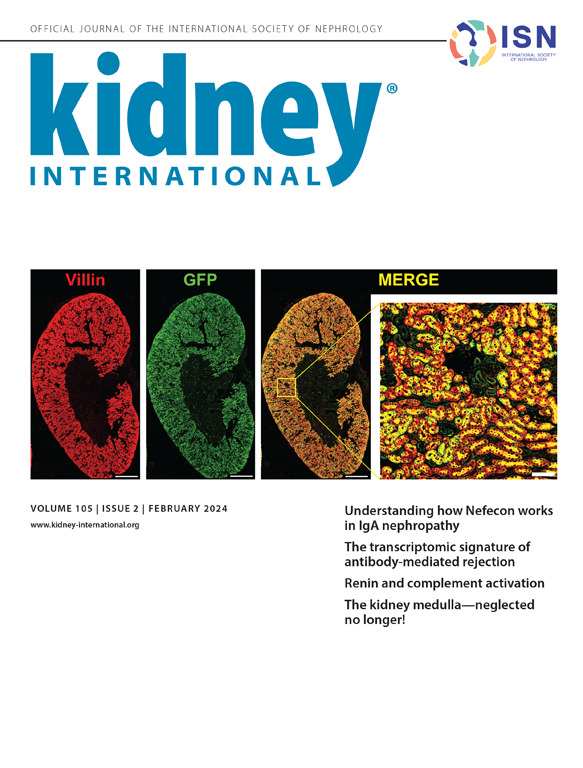成年小鼠中Pkd2的失活导致囊肿形成延迟,并将性别确定为疾病严重程度的主要修饰因素。
IF 12.6
1区 医学
Q1 UROLOGY & NEPHROLOGY
引用次数: 0
摘要
常染色体显性多囊肾病(ADPKD)是由PKD1或PKD2突变引起的,是最常见的导致肾衰竭的单基因疾病。由于小鼠中Pkd1或Pkd2的缺失都具有胚胎致死性,因此条件等位基因已成为研究ADPKD病理生物学和临床前检测不可或缺的工具。Pkd1条件小鼠的囊肿形成速度取决于基因失活的时间,但从未对Pkd2进行过系统的研究。在这里,我们在Pkd2条件小鼠模型中表征了膀胱形成的动力学,并确定了基因表达的相关改变。方法采用条件小鼠模型,在出生后不同阶段灭活Pkd2,并表征囊肿形成的严重程度。此外,我们进行了rna测序分析,以确定男性和女性中与Pkd2丢失相关的基因表达变化。结果在出生后第14天或以后,Pkd2失活后囊肿形成延迟的Pkd2条件小鼠也存在类似的发育开关。与Pkd1模型一样,囊发生与参与代谢、细胞增殖和免疫反应的基因的差异表达有关。我们证实,性别是ADPKD进展的关键修饰因子,在独立于Pkd2基因型的显著转录差异的背景下,疾病严重程度的差异发生在男性和女性之间。结论spkd2条件小鼠是了解ADPKD发病机制和检验治疗方法的有效模型。我们的数据强调了性别作为一个生物学变量的重要性,在使用Pkd2晚期失活的同源小鼠模型的任何研究设计中都应该考虑到这一点。本文章由计算机程序翻译,如有差异,请以英文原文为准。
Inactivation of Pkd2 in adult mice results in delayed cyst formation and identifies sex as a major modifier of disease severity.
INTRODUCTION
Autosomal Dominant Polycystic Kidney Disease (ADPKD) is caused by mutations in PKD1 or PKD2 and is the most common single-gene disorder resulting in kidney failure. Since deletion of either Pkd1 or Pkd2 in mice is embryonically lethal, conditional alleles have become indispensable tools for studying the pathobiology of ADPKD and for preclinical testing. The rapidity of cyst formation in Pkd1 conditional mice depends on the timing of gene inactivation, but this has never been systematically studied for Pkd2. Here, we characterize the kinetics of cystogenesis in a Pkd2 conditional mouse model and identify associated alterations in gene expression.
METHODS
Using a conditional mouse model, we inactivated Pkd2 at different postnatal stages and characterized the severity of cyst formation. Additionally, we performed RNA-sequencing analysis to identify gene expression changes associated with Pkd2 loss in males and females.
RESULTS
There is a similar developmental switch in Pkd2 conditional mice with delayed cyst formation after Pkd2 inactivation at or beyond postnatal day 14. Like Pkd1 models, cystogenesis is associated with differential expression of genes involved in metabolism, cell proliferation, and immune response. We confirm that sex is a key modifier of ADPKD progression with differences in disease severity occurring in the context of significant transcriptional differences between males and females that are independent of the Pkd2 genotype.
CONCLUSIONS
Pkd2 conditional mice are a useful model for understanding ADPKD pathogenesis and for testing therapeutics. Our data highlight the importance of sex as a biological variable that should be considered in any study design using orthologous mouse models with late Pkd2 inactivation.
求助全文
通过发布文献求助,成功后即可免费获取论文全文。
去求助
来源期刊

Kidney international
医学-泌尿学与肾脏学
CiteScore
23.30
自引率
3.10%
发文量
490
审稿时长
3-6 weeks
期刊介绍:
Kidney International (KI), the official journal of the International Society of Nephrology, is led by Dr. Pierre Ronco (Paris, France) and stands as one of nephrology's most cited and esteemed publications worldwide.
KI provides exceptional benefits for both readers and authors, featuring highly cited original articles, focused reviews, cutting-edge imaging techniques, and lively discussions on controversial topics.
The journal is dedicated to kidney research, serving researchers, clinical investigators, and practicing nephrologists.
 求助内容:
求助内容: 应助结果提醒方式:
应助结果提醒方式:


